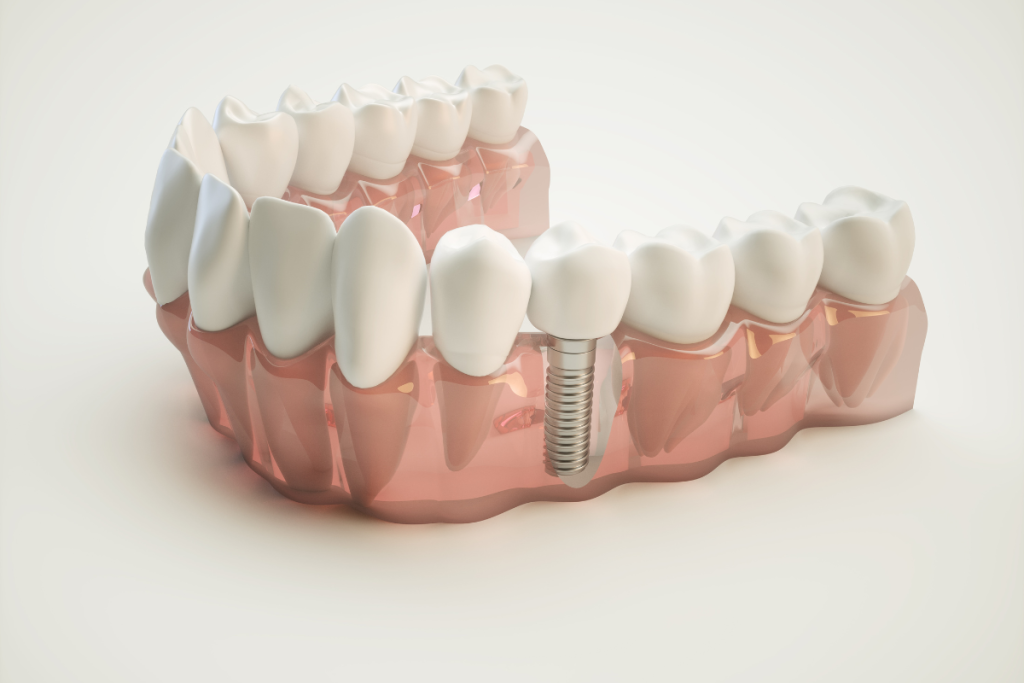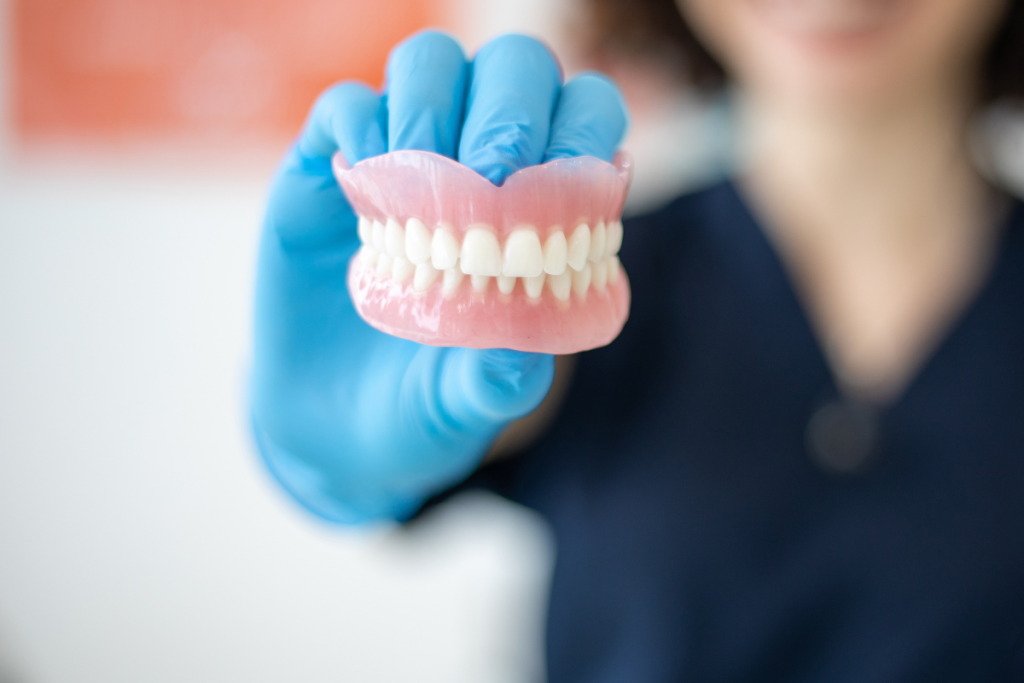As humans, we rely on our teeth for many daily activities. From eating to speaking, our teeth play a significant role in our lives. That’s why it’s important to ensure we have a complete set of teeth. Without them, we can’t do some of the things we enjoy most.
However, if you’re one of the many Australians who are missing teeth, you may be considering dentures or dental implants as a way to restore your smile and improve your quality of life. But which one is the better option for you?
This blog post will explore the pros and cons of dentures vs. dental implants and help you decide which is the best choice for you. Keep reading to learn more.
What are Dental Implants?

Dental implants are artificial replacement teeth. They are usually made of titanium, a strong and durable metal well-tolerated by the body.
These implants are surgically placed into the jawbone, fusing with the bone over time to provide a secure foundation for dental prosthetics such as crowns, bridges, and dentures. While dental implants are not suitable for everyone, they can be an excellent solution for those who have lost one or more teeth due to injury, tooth decay, or other causes.
Thanks to advances in dental technology, dental implants can now be used to restore the function and appearance of natural teeth.
The Pros and Cons of Dental Implants
The Pros of Dental Implants:
- They can last a lifetime with proper care
- They are anchored directly to the jawbone, providing a more secure fit
- They look and feel more natural
- They don’t require special additional care or maintenance
- They help preserve the jawbone, which can shrink over time when teeth are missing.
While dental implants are a great way to restore your beautiful smile, there are some potential disadvantages to be aware of.
The Cons of Dental Implants:
- They are more expensive
- They require surgery to place them in the mouth
- They require adequate jawbone density
- There is a risk of infection or inflammation at the implant site
- The gums around the implant need continuous monitoring for health
When are Dental Implants a Better Option?
Dental implants are one of the most popular tooth replacement options – and for a good reason. Unlike dental bridges or dentures, dental implants are anchored to the jawbone, providing a high level of stability.
In addition, dental implants are designed to blend in with natural teeth, making them virtually indistinguishable from the real thing. For these reasons, dental implants are often seen as the best option for tooth replacement.
What are Dentures?

Dentures are a type of prosthetic used to replace missing teeth, damaged teeth, or a severely-decayed tooth. They are removable and they are supported by the surrounding teeth, gums and bone.
There are different types of dentures but they are all usually made from acrylic or metal and can be either full or partial. Full dentures, or complete dentures, are used when all teeth are missing, while partial dentures are used when some natural teeth remain.
Dentures are custom-made to fit each patient’s mouth. They are held in place by the plastic denture base or denture adhesive and can be removed for cleaning. Dentures are an affordable way to improve the function and appearance of the smile, and they can also help prevent eating and speaking problems.
The Pros and Cons of Dentures
Dentures are a popular solution for people who have lost all or most of their natural teeth. They can give you back your smile and help you eat and speak more easily.
However, conventional dentures may not be suitable for everyone. Consider the advantages of dentures as well as the disadvantages when making a decision. Here are some things to consider if you’re thinking about dentures.
The Pros of Dentures:
- They can improve your appearance and give you back your smile.
- They can help you eat and speak more easily.
- They are easy to care for and can be removed for cleaning and at night.
- They are usually less expensive than other teeth replacements, such as bridges or implants.
The Cons of Dentures:
- They may feel uncomfortable at first and will take some time to get used to.
- They may make it difficult to pronounce certain words correctly.
- They loosen over time which means they may need to be replaced every five to seven years.
- They may slip or crack when you talk or eat.
They discolour over time. - You will need to see your dentist regularly to have your dentures checked or adjusted.
- Eating with dentures takes time to get used to, and you may have trouble chewing hard foods.
Procedure for Dentures vs. Dental Implants

For Dental Implants
Most dental implant surgeries are performed as outpatient procedures, followed by a period of healing time in between. Placement of a dental implant involves the following steps:
Step 1: The dentist will extract the damaged tooth if it is still present.
Step 2: For patients with insufficient bone to support the dental implant, bone grafting may be necessary. For patients with sufficient bone, this is not needed.
Step 3: The implant site is prepared by making a small incision in the gums and creating a hole in the jawbone.
Step 4: The titanium implant is inserted into the hole and allowed to heal for several months. Once the implant has fused with the bone in a process called osseointegration, a connector called an abutment is attached to it.
Step 5: Finally, a dental crown is placed on top of the abutment, completing the dental implant.
The entire process usually takes place over several months, but it can vary depending on each case.
For Dentures
The denture process is fairly straightforward and takes a few weeks to complete. Here’s the step-by-step process for dentures:
Step 1: Consultation with the dentist to discuss your options.
Step 2: Once you’ve decided on the type of denture that you want, impressions of the mouth are taken to create a model of the gums, bone and teeth if there are any.
Step 3: A denture is created based on this model.
Step 4: The denture is fitted to the mouth and adjusted as needed.
Step 5: Once the denture is ready, the dentist instals the denture and gives the patient instructions on how to take care of the dentures.
The denture process can vary slightly depending on the individual case, but these are the general steps involved.
What is the Difference Between Dentures and Dental Implants?
| Dental Implants | Dentures |
|---|---|
| Secure and stable | Loose and Mobile |
| Normal bite force | Reduced bite force |
| Denture adhesive not required | Denture adhesive required |
| Preserves jawbone and facial structure | Doesn't prevent jawbone deterioration |
| Feels and looks more like natural teeth | Doesn't look and feel as natural |
| Lasts longer | May need replacement sooner |
| More expensive | More affordable treatment option |
| Invasive procedure; requires dental surgery | Non-invasive; doesn't require dental surgery |
| Higher risk of infection at the implant site | Lower risk of infection |
| Longer healing process | No downtime |
| More complex treatment procedure | Simple installation procedure |
What to Consider When Choosing Dentures vs. Dental Implants
When it comes to replacing missing teeth, there are a few options to choose from. Dentures and dental implants are two of the most popular choices, but how do you know which one is right for you?
Here are a few things to consider when making your decision:
How many teeth are you missing?
What is your budget?
What is your lifestyle?
What are your preferences?
Are there Alternatives to Dentures and Dental Implants?

Dental Bridges
Temporary Partial Dentures
Temporary partial dentures are a great alternative to dentures and dental implants for those who want a nice, confident smile without having to commit to a long-term treatment option.
Temporary partial dentures are much less expensive than dental implants. As a removable denture, they can be removed anytime for easy cleaning. They are also more comfortable than dentures and do not require the same level of care.
These are made of high-quality materials that look natural and realistic. They are custom-made to fit your mouth and blend in with your existing teeth.
Tooth-Supported Overdentures
Tooth-supported overdentures, also called snap-in dentures, may be a good option for people looking for an alternative to traditional dentures or dental implants.
Overdentures are removable dental appliances supported by root stups of natural teeth. They are easier to keep in place than dentures and they are less expensive than dental implants.
No Teeth
Another alternative is to have no teeth at all! This may sound strange, but some people find that they don’t mind not having teeth and don’t want to go through the hassle of having dentures or implants.
Keep in mind that no matter what tooth replacement option you choose, good oral hygiene is needed in your daily life.
Final Thoughts
Dental implants and dentures are both excellent options for replacing missing teeth. When making a choice between dentures and implants, take the time to evaluate alternative treatments for restoring your lost teeth, consider your priorities, and what you want the prosthetics to accomplish. With this, you should be able to come to a conclusion with confidence.
Mundaring Dental Centre offers both dental implants and dentures as part of our comprehensive range of services. We have a team of experienced professionals who can help you make the best decision for your needs.
So whether you’re considering dental implants or dentures, or if you’re in the market for other forms of dental treatment, please book a dental appointment online or call us at (08) 6495 2000 today!
ACHIEVE A BEAUTIFUL SMILE WITH DENTAL IMPLANTS
Do you have one or more missing teeth? Are you looking for a treatment for your broken and decayed teeth? If you answered yes, visit our dental clinic to have high-quality dental implants.
 By Dr. Rahul Pankhaniya
By Dr. Rahul Pankhaniya 
